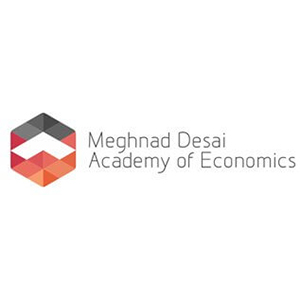MDAE hosts panel discussion on India's economic future

Entitled ‘The Emerging Market Turmoil, How will India Cope?’ the panel featured representation from noted leaders in the industry, media and academia
Meghnad Desai Academy of Economics (MDAE), one of the leading institutes for post-graduate in Economics, recently hosted a panel discussion on India’s economic position. Entitled ‘The Emerging Market Turmoil, How will India Cope?’ the discussion touched upon the various economic challenges and recent developments in the emerging markets around the world. Noteworthy panelists – Saurabh Mukherjea (CEO, Ambit Capital), Ajit Ranade (Chief Economist, Aditya Birla Group), Niranjan Rajadhyaksha (Executive Editor, Mint) and Indradeep Ghosh (Dean, MDAE) were present to discuss on the many issues and factors contributing towards the current economic uncertainty within the Indian as well as global markets.
The discussion identified various factors that are affecting markets like India including the changes brought about by the Trump administration, the rupee depreciation, changing US interest rates and Indian economic imbalances. The panelists discussed at length about the current RBI Governor Urjit Patel’s recent appeal to the Federal Reserve Bank via an op-ed piece in The Financial Times, the effects of the Trump administration’s tax cuts, the causes of the increasing current account deficit, the fiscal position of India amongst the emerging markets in the world and currency instability.
The panelist began the discussion about RBI Governor Urjit Patel’s edit piece in The Financial Times. Saraubh Mukherjea said, “It is an unprecedented event that an RBI Governor has written an editorial piece in The Financial Times to highlight upon the issues that the Indian economy is facing. He highlighted US Federal Reserve’s decision to reduce their holdings in the US government bonds. But due to the Trump administration’s recent historic tax cuts, the budget deficit will be widened and it will lead to more bonds being issued. This will cause paucity in buyers in the US bond market and also affect foreign investments in the emerging markets.”
Speaking on the Indian bond markets and economic imbalances, Niranjan Rajadhyaksha said,“ India is in a better position right now than it was 5 years ago with lower inflation, current account deficit and fiscal deficit. But we are not completely insulated from global changes in the market. In a year or two, India would have a current account deficit of nearly $60 billion. While half of this will be paid for by Foreign Direct Investments (FDI), the other half will be paid for by Foreign Institutional Investors (FII). This is where the US interest rates are playing an impactas their effects can be already seen in the bond market. In the past 5 months only, nearly $5 billion of Indian bonds have been sold by foreign investors,”
On the issue of rupee depreciation, Ajit Ranade said, “Our trade deficit needs to be sufficiently smaller in the near future. India’s dependency on FDI and capital inflows to meet this rising trade deficit is a troubling matter and it needs to be checked. The other problem that needs to be addressed is the currency instability. India’s currency has fallen about 7-8 percent this year. Excluding Argentina and Turkey, it is the worst performing currency amongst the emerging markets in the world. Thus we need to bring stability in the currency exchange rates as even a 1 percent change can have huge effects for the Indian as well as global markets.”
Post the discussion, the panelists answered questions asked by the audience with regards to exports financing the current account deficit, manufacturing lead growth, Switzerland’s referendum on the sovereign money initiative and whether the Indian defense sector should adopt the Israel model.
Commenting on the discussion, Professor Indradeep Ghosh, Associate Professor and Faculty Dean, MDAE, said, “We have been privileged to be associated with such eminent personalities and leaders who agreed to be a part of our panel. The discussion was engaging, educational, in depth and illuminating as the panelists discussed the various factors and issues that are affecting the Indian economy and the need to address the same. I hope this helps in enlightening not only students but also professionals, policymakers and industry veterans to take note and bring about an incremental change within the country.”
MDAE has quickly established itself as an exceptional centre of academic excellence through its meticulous approach to a holistic education in the field of economics for its students. Its programs are created with substantial input and participation from top-ranking corporates, with a view to enhancing and improving the employment opportunities for its graduates. In addition to organizing panel discussions and other events featuring thought leaders and experts, the Academy also provides mentorship and networking opportunities that helps its students rub shoulders with the best in industry, media, and government.
About MDAE:
Meghnad Desai Academy of Economics (MDAE) is the top institute for post-graduate Economics education based in Mumbai, India and affiliated to the Mumbai University’s Department of Economics. Established and launched in June 2015, MDAE has been set up as an academic institution of excellence to provide graduate students with the academic rigour and applied skills to meet the needs of a dynamic and globalized workplace. The institute offers postgraduate diploma courses in economics, and short-term programs in mathematics and statistics as part of its Summer School programs, which have been created with substantial input and participation of top-ranking corporates to improve the employability of students.

